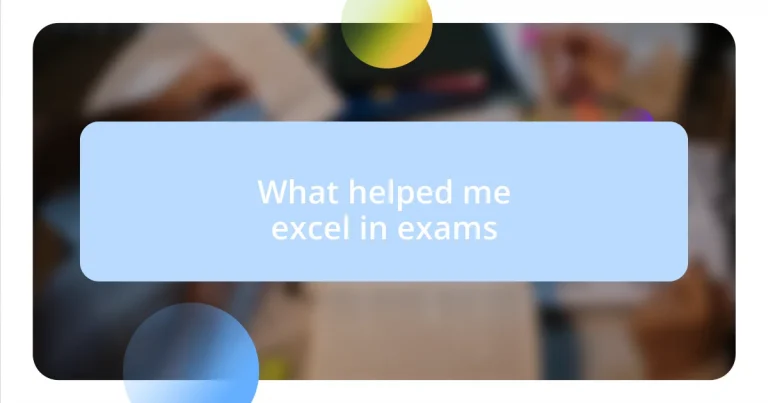Key takeaways:
- Adopting effective study habits, such as a structured study schedule and active recall, greatly enhanced understanding and retention of material.
- Practicing with past exam papers and engaging in group discussions provided valuable insights and confidence, transforming exam preparation into a familiar process.
- Maintaining a positive mindset through visualization, gratitude exercises, and self-affirmations proved essential for overcoming anxiety and boosting motivation during exams.
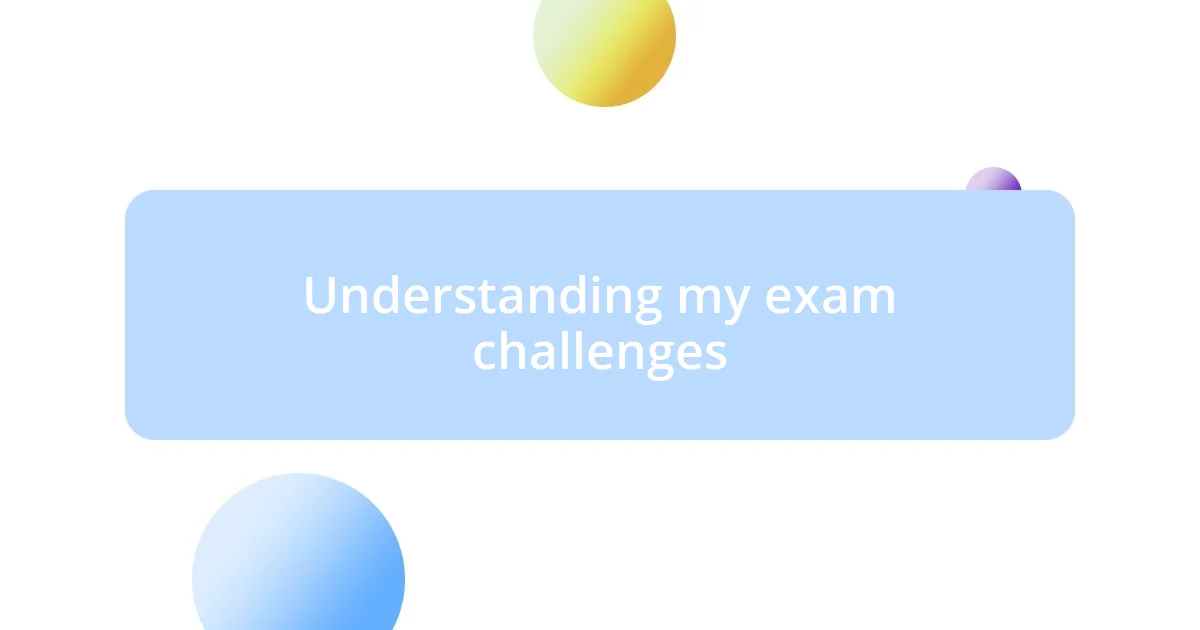
Understanding my exam challenges
Exam challenges were a maze I often found myself lost within. I remember facing a particularly tough math exam; I had studied diligently, yet the moment I sat down, anxiety wrapped around me like a heavy blanket. How many of you have felt your mind go blank just when you need it the most?
There were moments when the sheer volume of content felt overwhelming. I could spend hours poring over textbooks, but I still had that nagging doubt: did I retain anything? I once memorized a long list of definitions, only to find out on test day that I could not recall a single one. It’s a vulnerability I’m sure many share, and it made me question my study methods.
Some of my greatest takeaways came from reflecting on those experiences. A candid look at my challenges helped me realize that the pressure I felt was part of the journey. Acknowledging my struggles allowed me to reshape my approach to studying, and ultimately, I became more resilient. Have you ever stopped to think about how your challenges can guide you toward improvements?
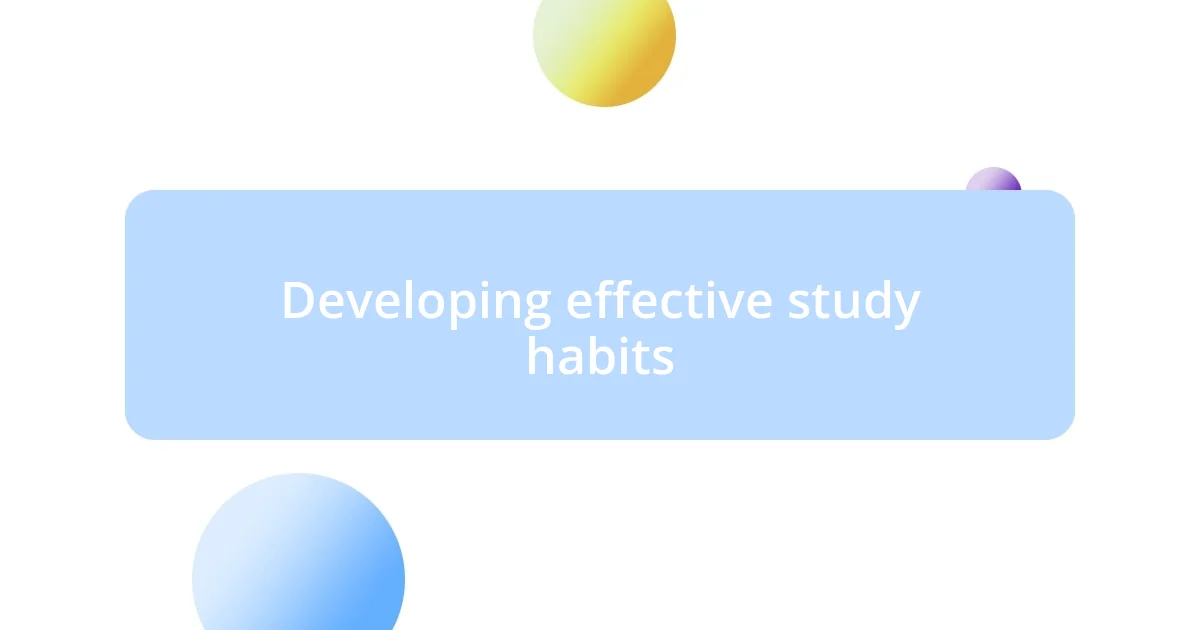
Developing effective study habits
Developing effective study habits is essential for transforming chaos into clarity. I remember when I first embraced the idea of a study schedule; it felt liberating to have a plan. Instead of cramming the night before, I broke my subjects into smaller sections across the week. It was like turning down a path that had always been obscured by weeds—suddenly, everything became manageable, and I started to truly understand what I was studying instead of just memorizing it.
Another key habit I cultivated was the active recall technique. Instead of simply reading my notes, I would quiz myself without looking. I recall sitting at my kitchen table, flashcards strewn around me, and realizing how much better I could remember when I actively engaged with the material. It was a game changer; I felt like I was having a dialogue with the material instead of just passively absorbing information. Have you ever tried actively recalling information? It really makes you think!
Finally, ensuring I had a distraction-free environment was crucial. I realized that studying near my phone was counterproductive. I still remember that one evening, after getting sidetracked by social media, feeling defeated as the clock ticked away. The simple act of turning my phone off transformed my focus and productivity. Notice how often our environment shapes our ability to retain information? Finding that elusive concentration can make all the difference.
| Study Habit | Description |
|---|---|
| Study Schedule | Allocating specific time slots for studying various subjects. |
| Active Recall | Testing yourself on the material instead of passive reading. |
| Distraction-Free Environment | Creating a space without interruptions to boost focus. |
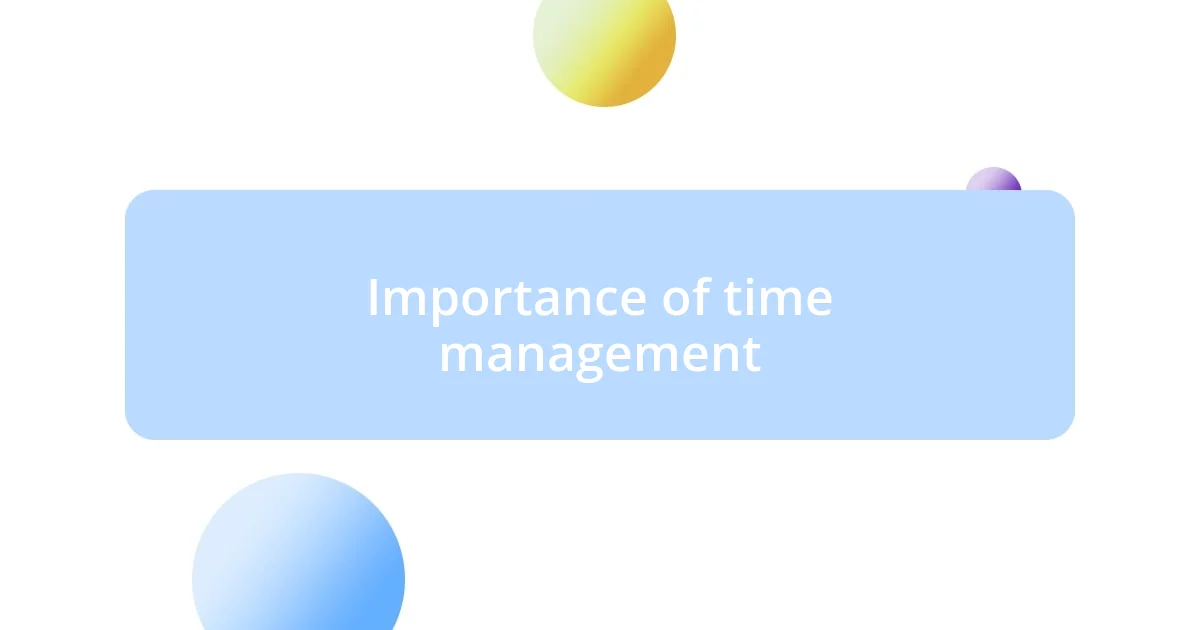
Importance of time management
Time management was a game changer for me during exams, transforming chaos into confidence. I used to think I could wing it, but cramming often led to stress rather than success. One time, I sat for an exam knowing I hadn’t allocated enough time for review. As I flipped through the questions, panic set in—I realized my preparation was incomplete. I felt a sinking feeling in my stomach, one I won’t soon forget. It became clear to me that managing my study time effectively would mean the difference between anxiety and achievement.
- Prioritizing Tasks: I learned to identify which subjects needed more attention, allowing me to focus on what challenged me most.
- Setting Realistic Goals: Breaking down my study sessions into achievable goals made each study block feel less daunting.
- Avoiding Procrastination: I made a commitment to start studying earlier, and it helped alleviate that last-minute pressure.
- Scheduling Breaks: Scheduling regular breaks kept my mind fresh and engaged, improving retention when I returned to studying.
After making these adjustments, I found myself entering exams more relaxed and ready. It’s liberating to feel prepared, and I can personally attest to how much easier studying becomes when time is on your side. Have you ever felt that sense of calmness when you know you’ve managed your time well?
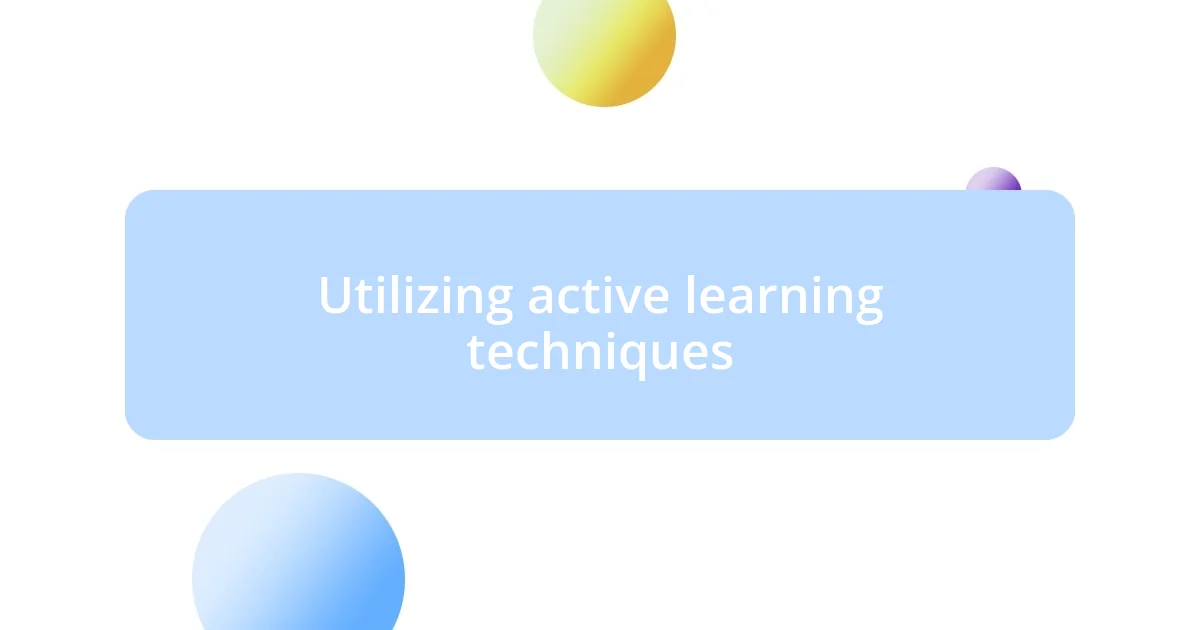
Utilizing active learning techniques
Utilizing active learning techniques made a significant impact on my exam preparation. For example, instead of simply reading through textbooks, I would turn each chapter into a mini-study session. I vividly recall one afternoon when I transformed my study area into a lively space, filled with diagrams and sticky notes. Not only was I engaging with the material visually, but I also allowed myself to explore concepts through drawing connections. Have you ever had that “aha” moment when you realize how everything fits together? It’s exhilarating!
One of my favorite active learning strategies was teaching the content to my friends. We’d gather around a table, and each of us would take turns explaining topics we’d learned. I remember the first time I had to teach a complex concept; I felt nervous, but as I spoke, it solidified my understanding and exposed areas I needed to review. Teaching really forced me to clarify my thoughts and retain information better—what a win-win! Have you ever noticed how discussing what you’ve learned helps reinforce it?
Group activities like quizzes also boosted my retention dramatically. During one study group session, we played a trivia game based on our syllabus. I felt a rush of adrenaline every time I got a question right! This fun, competitive element made studying far more enjoyable. It wasn’t just about getting the right answers; it was about the thrill of collaboration and shared learning. Have you tried transforming your study sessions into something more interactive? I can assure you, it can turn the mundane into something extraordinary!
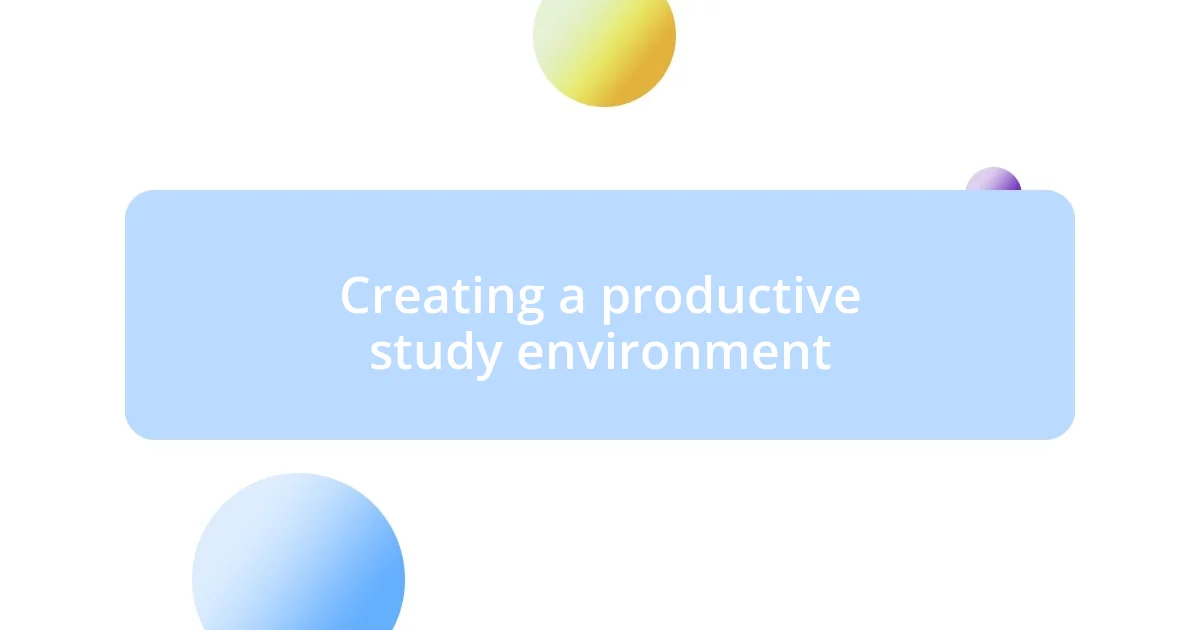
Creating a productive study environment
Creating a conducive study environment was crucial for my success in exams. I remember when I designated a corner in my room as my dedicated study zone. It was amazing how just changing my surroundings could boost my focus. I adorned the space with motivational quotes, a plant for freshness, and kept my materials organized. Have you ever noticed how a clutter-free space clears your mind? It’s like a mental reset.
Lighting also played a significant role in my study setup. I experimented with different sources—from bright overhead lights to warm desk lamps. I found that soft lighting in the evening made the atmosphere cozy and less intimidating. I recall one late-night study session when the dim glow of my lamp created just the right vibe for deep concentration. How about you? Do you find certain lighting helps you dive deeper into your study materials?
Finally, I realized the importance of eliminating distractions in my study environment. Initially, I’d leave my phone on the desk, thinking I could ignore it. But soon, notifications would pull me out of my zone. I learned to silence my phone and even use apps to block distracting websites while I studied. I vividly remember the productivity surge I felt when I did this; it was like finally putting on a pair of glasses to see the material clearly. How has reducing distractions improved your focus when studying?
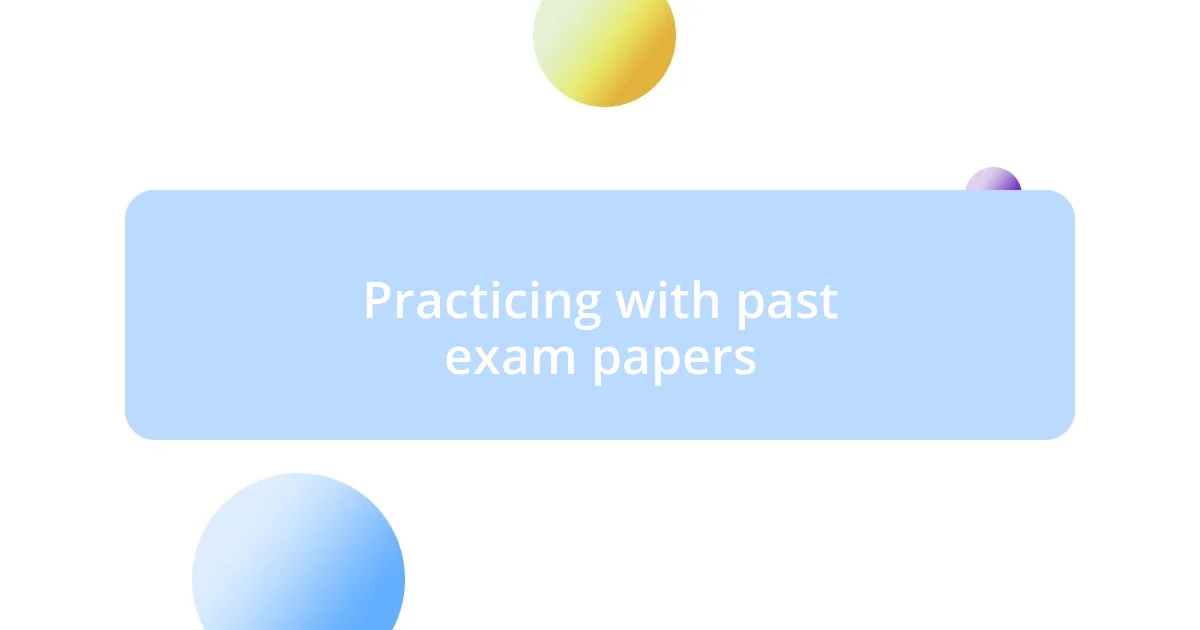
Practicing with past exam papers
Practicing with past exam papers truly transformed my preparation approach. I can still feel the anticipation every time I sat down with one of those papers, as if I was opening a door to familiarity. It’s incredible how these papers not only provided a glimpse into the types of questions I might face but also intensified my confidence. Have you ever experienced that surge of assurance when you recognize a question pattern? It’s like having a secret key to unlock better performance!
I remember the first time I attempted a past exam paper under timed conditions. The clock ticked loudly, and my heart raced, but it simulated the exam day perfectly. Afterward, as I reviewed my answers, I could spot areas of improvement. Each mistake became a learning opportunity, making me determined to confront my weaknesses head-on. Isn’t it interesting how failure can be a powerful teacher? As I reflected on my errors, I crafted a strategy to tackle those tough areas, ensuring I wouldn’t let them catch me off guard again.
Moreover, discussing past paper questions with friends was a game-changer for me. We often turned those sessions into a mini-exam experience, and it was fascinating to hear different perspectives on solving the same question. I distinctly recall a late-night study marathon, where a friend’s unique approach to a tricky math problem opened my eyes to alternative methods. Engaging in this way, have you noticed how insights from peers can illuminate your understanding? It enriched my knowledge while simultaneously bonding us in a shared pursuit of success!
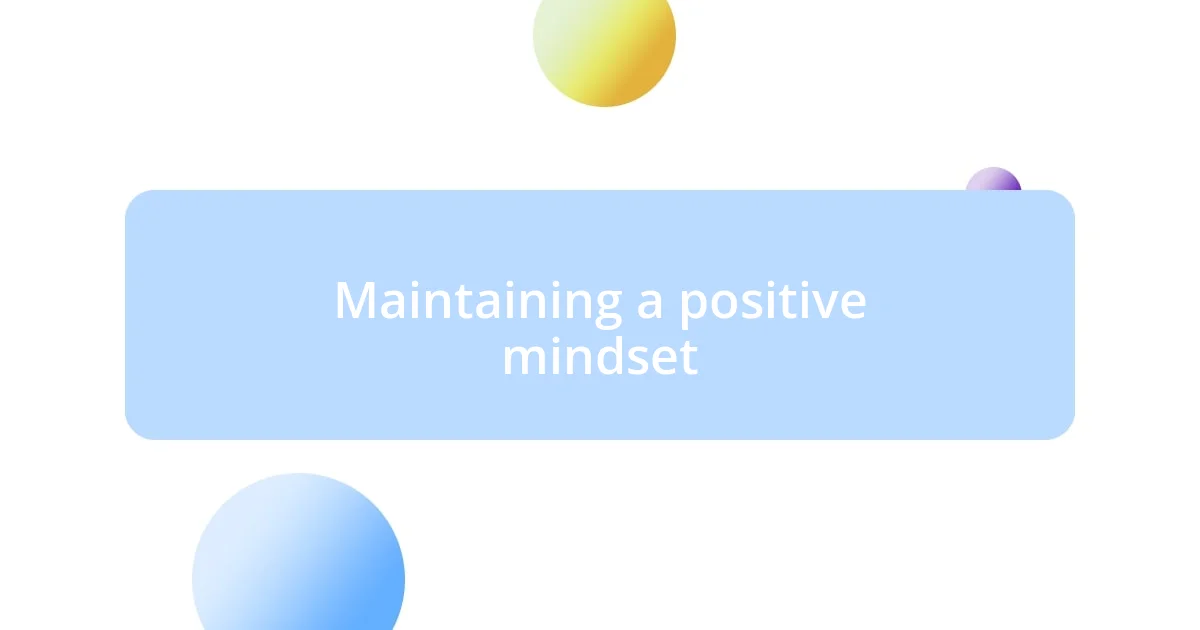
Maintaining a positive mindset
Maintaining a positive mindset was a game-changer for me during exams. I often envisioned my success before even starting to study, which helped me feel more confident. I remember a particularly challenging subject that made me doubt myself at times. But instead of succumbing to that negativity, I focused on visualizing myself acing the exam. Have you ever noticed how a strong mental image can shift your entire perspective on a tough task? It’s empowering.
I found gratitude exercises to be incredibly uplifting. Each morning, I would jot down three things I was grateful for, shifting my focus from stress to appreciation. On a tough study day, I recall writing about the supportive friends I had and the resources at my disposal. This simple shift made me realize that I was not alone in my journey. When was the last time you paused to appreciate the little things in your life? This practice allowed me to approach my studies with renewed motivation.
Finally, I discovered the impact of self-affirmations. Reading positive affirmations aloud became my pre-study ritual. For instance, I would affirm, “I am capable of mastering this material.” I can still remember the first time I felt that rush of confidence wash over me as I said it. It felt like turning on a switch that brightened my spirit. How powerful are those little words we say to ourselves? They shaped my mindset significantly, proving that a little positivity can go a long way in overcoming academic obstacles.












